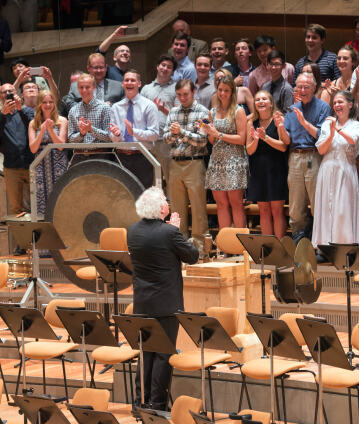Simon Rattle’s farewell with Mahler’s Sixth

On 14 November 1987, a promising conductor made his Berliner Philharmoniker debut with Gustav Mahler’s Sixth Symphony: Simon Rattle. In retrospect Rattle says, “I felt that I was finding my voice on that day.” Mahler’s multifaceted work was also on the programme when Sir Simon gave his last concert in the Philharmonie as the orchestra’s chief conductor. The wheel comes full circle.
The exploration of Gustav Mahler’s symphonic oeuvre represents a constant in the now 30 year-long artistic collaboration of Sir Simon Rattle and the Berliner Philharmoniker. In 1987, Sir Simon made his debut with the Philharmoniker with a performance of Mahler’s Sixth Symphony, and for his inaugural concert as artistic director of the orchestra in 2002, he included Mahler’s Fifth on the programme. The performances of all of Mahler’s symphonies in the 2010/2011 and 2011/2012 seasons, acclaimed by audiences and critics alike, marked one of the many highlights of the collaboration of Sir Simon and the Berliner Philharmoniker. And so we come full circle: for his last concert in the main auditorium of the Philharmonie as chief conductor, he has once again chosen to present the symphonist’s visionary Sixth.
In her 1940 Gustav Mahler: Memories and Letters, the composer’s widow wrote about the work, written between 1903 and 1905, that “no work flowed as directly from his heart as this,” and added that the Sixth was “the most completely personal of his works, and a prophetic one too”. Yet Mahler struggled with its final form. Following the premiere in Essen in 1906, the composer made several revisions to the score, including changing the order of the two middle movements. On the surface, Mahler’s Sixth appears to be more committed to the classical genre tradition than any other of the composer’s symphonies: it is in four movements, has a clear, harmonic disposition (three of the four movements are in the principal key of A minor) and it opens with a first movement whose exposition is repeated as specified by the composer. Nevertheless, Mahler was convinced his Sixth would pose “riddles that can be solved only by a generation that has assimilated and digested my first five”.
Mahler’s Sixth was indeed to prove to be the work by the composer that initially caused the greatest difficulties to posterity due to the complex structure of its movements and its new forms of expression. The monumental finale, whose abrupt end calls into question the whole course of the movement and led the Sixth even during Mahler’s lifetime to be known as the “Tragic”, is particularly demanding. Yet only two years after the premiere of the work, no less than Alban Berg declared that notwithstanding Beethoven’s Pastoral, “there is only one VI.” – and that was Mahler’s!
© 2018 Berlin Phil Media GmbH
Related interviews
Artists
Our recommendations
- Simon Rattle conducts Stravinsky and Rachmaninov
- Beethoven’s Piano Concerto No. 1 with Mitsuko Uchida and Simon Rattle
- “Late Night” concert with Simon Rattle
- Simon Rattle conducts a Beethoven evening in Taipei
- Season opening 2016: Simon Rattle conducts Mahler’s Seventh Symphony
- Simon Rattle conducts Beethoven’s Symphonies Nos. 4 and 7